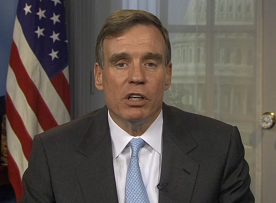Sen. Warner Wants More from Social Media on Election Protection
Writes CEOs of Big Three

The smarter way to stay on top of the streaming and OTT industry. Sign up below.
You are now subscribed
Your newsletter sign-up was successful
Sen. Mark Warner (D-Va.), co-chairman of the Senate Intelligence Committee and a former tech exec, is calling on Facebook, Twitter and Google to implement "robust accountability and transparency standards" in the run-up to the November election.
He said that should include requirements in his Honest Ads Act, which has yet to pass the Congress.
Warner sent individual letters to the companies' CEOs outlining the ways he thinks they continue to contribute to the spread of "disinformation, viral misinformation, and voter suppression."
The companies appeared to have already gotten the message. Twitter flagged a COVID-19-related tweet from the President as misinformation and Facebook restricted the account of conservative radio talk show host Mark Levin for "repeatedly sharing false news," a charge Levin disputes.
Warner warned of the "imminent risk of bad actors once again weaponizing American-bred social media tools to undermine democracy ahead of the November election."
Warner's committee conducted an extensive investigation into Russian election meddling in the 2016 election, including via social media.
“The pervasiveness of political misinformation on Facebook – and the ways in which your company chooses to amplify it – was on display just this week, when a baseless conspiracy about Vice President Biden was highlighted on Facebook’s own News Tab, a result of Facebook choosing to amplify The Daily Caller as a verified news publisher and fact-checker despite its long track record of promoting false information,” wrote Warner in the letter to Facebook CEO Mark Zuckerberg.
The smarter way to stay on top of the streaming and OTT industry. Sign up below.
Warner gave Twitter props for the efforts it has taken to flag content, but wanted more. “I appreciate the leadership Twitter has demonstrated to take steps against the promotion of false, deceptive, and manipulated political content," he wrote CEO Jack Dorsey. "[H]owever, more must be done to secure our political discourse from disinformation on digital platforms like yours."
Warner praised Facebook for another move, its banning of accounts connected to the QAnon conspiracy theory, but with a caveat.
“I’m pleased to see Facebook take action against this harmful and increasingly dangerous conspiracy theory and movement," said Warner, pointing out he had encouraged the company to take the threat of QAnon more seriously since Facebook had a role in its growth. "Ultimately the real test will be whether Facebook actually takes measures to enforce these new policies – we’ve seen in a myriad of other contexts, including with respect to right-wing militias like the Boogaloos, that Facebook has repeatedly failed to consistently enforce its existing policies.”
Contributing editor John Eggerton has been an editor and/or writer on media regulation, legislation and policy for over four decades, including covering the FCC, FTC, Congress, the major media trade associations, and the federal courts. In addition to Multichannel News and Broadcasting + Cable, his work has appeared in Radio World, TV Technology, TV Fax, This Week in Consumer Electronics, Variety and the Encyclopedia Britannica.

